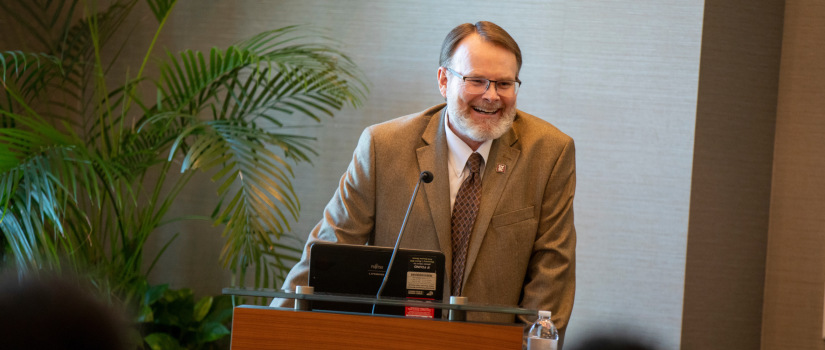As the Arnold School celebrates 45 years of excellence, I am amazed by our progress over the past four decades and extremely excited about where we are headed.
Enrollment in our B.S. and B.A. public health and B.S. exercise science programs has risen to more than 2380 since the first five students matriculated in 2008. We also offer minors in Health Promotion, Education, and Behavior as well as Nutrition and Food Systems to a broad spectrum of majors across the university. Many of our undergraduates participate in research and community service projects, win national awards to pursue scholarly activities, or become recognized with the University’s highest honors.
Our success is told through the achievements of our alumni, faculty, staff, students and donors.
Thomas Chandler, Dean
Our master’s and doctoral students total more than 770 motivated individuals who are studying to become researchers, educators and practitioners. Not only do we have the only accredited school of public health in the state, our graduate students consistently win campus, state and national honors in scholarship, academic achievement and service. Our doctoral program in exercise science was has been recognized “No. 1 in the USA” by the National Academy of Kinesiology for the second five-year cycle in a row. All of our doctoral and many of our master’s students publish their research with faculty mentors in the most respected journals in their fields. In 2021, Arnold School faculty and students published a record 719 peer-reviewed articles. That number is growing and along with grantsmanship leads USC as “the” metric to beat for scholarly productivity.
Essential to the success of our students is strong support from faculty and staff. Our award-winning faculty now number more than 177 scientists and clinicians. (The school began in 1975 with only seven faculty, cobbled together from various departments around campus.) All faculty mentor students inside and outside the classroom, engaging them in nearly every aspect of their work—work that makes a major impact on public health, locally and globally. Our faculty just completed a third record year in extramural funding, garnering nearly $43.5 million for the fiscal year 2021.
In philanthropy, friends and donors to the Arnold School have contributed more than $42 million to scholarships, professorships and programs over the Carolina Promise five-year campaign. In 2015, the Arnolds—the same couple who gifted $10 million in 2000—pledged an additional $7 million to create the Gerry Sue and Norman J. Arnold Institute on Aging. The new institute supports a broad range of center-level activities leveraged with funding, such as that of the National Institutes of Health, to address issues, such as childhood obesity prevention, nutrition and food safety, stroke recovery and dementia, that affect our most vulnerable populations—children and the elderly.
In these times of diminished state funding for higher education, these grants and gifts are so important to the work we do here. They support research across our six departments, which focus on some of the most serious problems affecting the health of people and of the environment. For example, our researchers have developed novel community-based approaches to identify and mitigate health disparities in cancer, diabetes, stroke, heart disease, maternal and child health, food insecurity, physical activity, ADHD and environmental health among children. They are also examining literacy, chronic stroke recovery, obesity, food safety, healthy aging, tobacco control and the COVID-19 pandemic. Arnold School faculty influence smart policies related to health care delivery and enhancing access to health care providers for underserved populations. And so much more!
All faculty mentor students inside and outside the classroom, engaging them in nearly every aspect of their work--work that makes a major impact on public health, locally and globally.
Thomas Chandler, Dean
We now have five Smartstate™ Endowed Chairs in the Arnold School, whose Centers focus on environmental nanotechnology, healthful lifestyles through technology, improved orthopedic outcomes, brain health and improved healthcare quality through translational clinical research. These centers are on the cutting edge of innovative research, bringing critical discoveries and processes to life, such as inexpensive and eco-friendly technologies for environmental cleanup and innovative electronic games to get children moving.
Our service and outreach programs impact various populations across South Carolina and beyond. The Dementia Dialogues Program, which has trained 21,000 South Carolinians to serve as caregivers for individuals with Alzheimer’s disease and dementia, is now undergoing a national rollout. The Center for Community Health Alignment is home to the Community Health Worker Institute and PASOs and has already garnered national recognition and reach. Each year, our Montgomery Speech-Language-Hearing Clinic logs more than 6,000 patient visits and 225 patient outreach hours, providing diagnostic and treatment services for individuals of all ages who have communication challenges in the areas of articulation, fluency, voice, language and literacy, and hearing.
With both depth and breadth of expertise in teaching, research and service, the Arnold School is dedicated to improving the health of people, communities and the environment—statewide and worldwide. Our success is told through the achievements of our alumni, faculty, staff, students and donors. I am so looking forward to seeing what this School will accomplish over the next 45 years!
